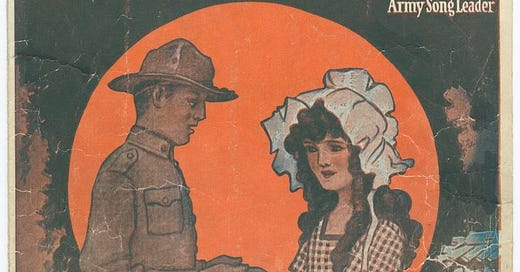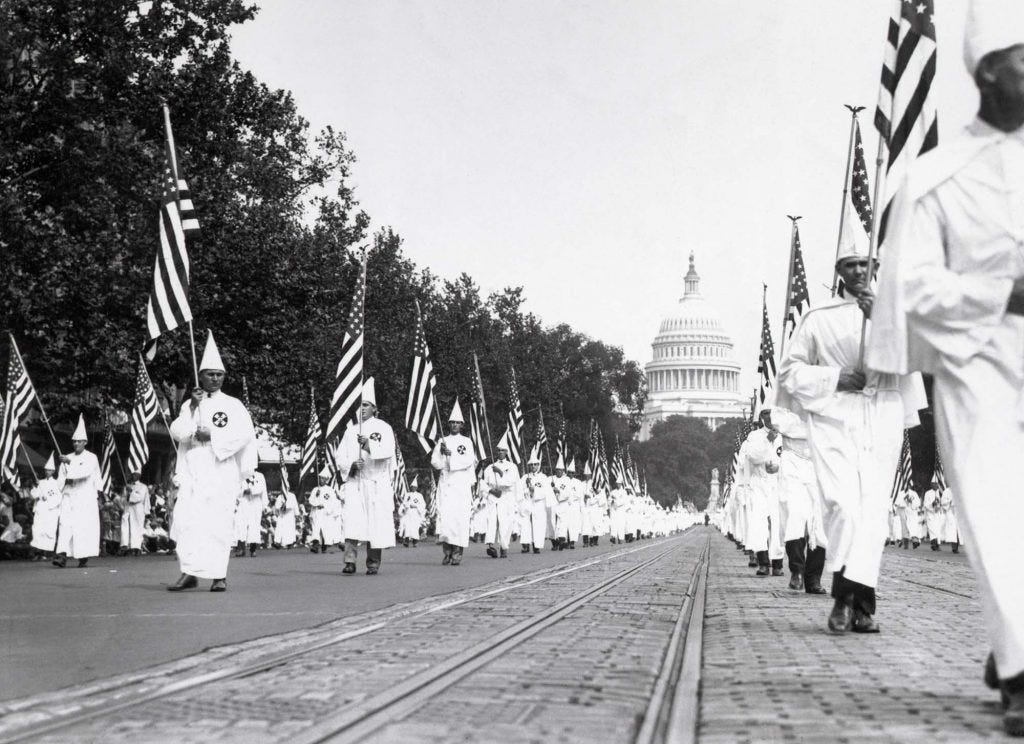A couple of weeks ago, I wrote about how the meaning of the phrase “making love” had evolved from the speaking of affectionate words to the deed the speaker often hopes will follow the speaking of said words. And how this shift has rendered old movies and novels unintentionally hilarious for modern eyes.
It took roughly half a century for “making love” to evolve from the romantic to the kinetic, but the eye-widening misunderstandings linguistic shifts can produce can happen much more quickly than that.
I have one for you now. But rather than type it out, I’ll reproduce an image and allow you to enjoy the sensation of eyelids receding into forehead and eyes bulging forth.
The image below is a the cover of the sheet music for a popular song.
The song was written in 1917. The sheet music was published in 1918.
And now I’ll ask you to scroll down and behold….
That’s right. It’s a popular song called K-K-K-Katy.
It would not be unreasonable to think that K-K-K-Katy is an ode to a fair damsel with blue eyes glowing by the light of a burning cross. The image above was published in 1918, after all. Three years earlier, D.W. Griffith released Birth of a Nation, an epic portrayal of the supposedly glorious knights of the Ku Klux Klan.
Griffith’s movie was such a brilliant work of propaganda that the KKK, which had been stamped out forty years earlier, was refounded in Georgia. It later spread rapidly and in the 1920s — the era of “one hundred percent Americanism” — became a major force in American politics. Membership estimates at its peak ranged up to eight million. Along with cross burnings and horrific lynchings, the Klan held enormous public rallies. It even spread to Canada. In Saskatchewan, the KKK became powerful enough that it managed to elect on of its members to Parliament in Ottawa.
So it’s not farfetched to think there was a pop song about a Ku Kluxer named Katy. In fact, K-K-K-Katy was so popular that in 1924 the Klan actually published a rewritten version using the title K-K-K-Klanswoman.
But the song is innocent.
As the tagline above makes clear — “the sensational stammering song success” — the lyrics are in the voice of a soldier who loves the fair Katy. The soldier stutters. The “K-K-K-” is the soldier struggling to say Katy’s name.
The only negative sentiment in the song is directed at the K-K-K-Kaiser.
Jimmy was a soldier brave and bold,
Katy was a maid with hair of gold,
Like an act of fate, Kate was standing at the gate,
Watching all the boys on dress parade,
Jimmy with the girls was just a gawk,
Stuttered ev'ry time he tried to talk,
Still that night at eight,
He was there at Katy's gate,
Stuttering to her this love sick cry.
No one ever looked so nice and neat,
No one could be just as cute and sweet,
That's what Jimmy thought,
When the wedding ring he bought,
Now he's off to France the foe to meet.
Jimmy thought he'd like to take a chance,
See if he could make the Kaiser dance,
Stepping to a tune,
All about the silv'ry moon,
This is what they hear in far off France.
Refrain:
"K-K-K-Katy, beautiful Katy,
You're the only g-g-g-girl that I adore;
When the m-m-m-moon shines,
Over the cow shed,
I'll be waiting at the k-k-k-kitchen door."K-K-K-Katy was written by a Canadian, Geoffrey O’Hara, who apparently was inspired by a real Katy — Katherine Craig Richardson — who lived in Kingston, Ontario.
Still, the stammering thing is a little weird, and would be offensive today. But it’s worth recalling that it was a mere 47 years ago that another Canadian, Randy Bachman, had a pop hit featuring a woman stammering to a man. (“B-b-b-baby, you just ain't seen n-n-n-nothin' yet.”)
As David Bowie almost sang, but didn’t, some things don’t ch-ch-ch-ch-change.






The stuttering vocals on "You Ain't Seen Nothing Yet" came from the band goofing around in the studio. Randy Bachman was imitating other famous singers like Frank Sinatra and as a joke, he sang it like his brother, who had a speech impediment. It was never meant to end up on an album, much less released as a single, but the record company knew they'd inadvertently struck gold.
You have totally mirepresented the intent of the song. This was 1918, no radio, no tv, and movies were just starting to be created. People used to sing together, with piano, for enjoyment. To somehow connect this to the KKK is a total block missing from your thinking. It was a Popular song, that someone in the KKK liked, because probably everyone everywhere south of the Canadian Border liked it too. Please read your history deeper.